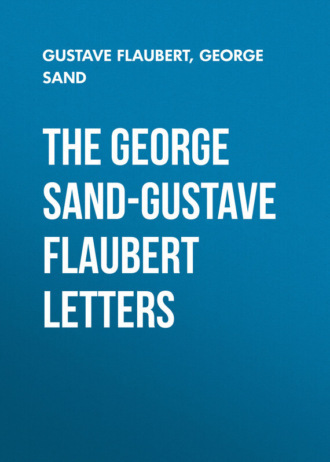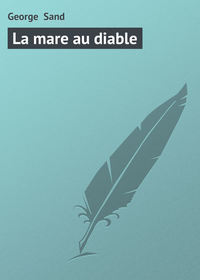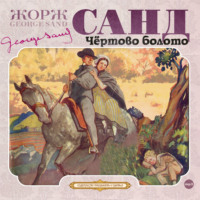 полная версия
полная версияThe George Sand-Gustave Flaubert Letters
And the novel, is it getting on? Your courage has not declined? Solitude does not weigh on you? I really think that it is not absolute, and that somewhere there is a sweetheart who comes and goes, or who lives near there. But there is something of the anchorite in your life just the same, and if envy your situation. As for me, I am too alone at Palaiseau, with a dead soul; not alone enough at Nohant, with the children whom I love too much to belong to myself, – and at Paris, one does not know what one is, one forgets oneself entirely for a thousand things which are not worth any more than oneself. I embrace you with all my heart, dear friend; remember me to your mother, to your dear family, and write me at Nohant, that will do me good.
The cheeses? I don't know at all, it seems to me that they spoke to me of them, but I don't remember at all. I will tell you that from down there.
XLIII. TO GEORGE SAND
Croisset, Saturday night
No, dear master, you are not near your end. So much the worse for you perhaps. But you will live to be old, very old, as giants live, since you are of that race: only you MUST rest. One thing astonishes me and that is that you have not died twenty times over, having thought so much, written so much and suffered so much. Do go then, since you have the desire, to the Mediterranean. Its azure sky quiets and invigorates. There are the Countries of Youth, such as the Bay of Naples. Do they make one sadder sometimes? I do not know.
Life is not easy! What a complicated and extravagant affair! I know something about that. One must have money for everything! So that with a modest revenue and an unproductive profession one has to make up one's mind to have but little. So I do! The habit is formed, but the days that work does not go well are not amusing. Yes indeed! I would love to follow you into another planet. And a propos of money, it is that which will make our planet uninhabitable in the near future, for it will be impossible to live here, even for the rich, without looking after one's property; one will have to spend several hours a day fussing over one's INCOME. Charming! I continue to fuss over my novel, and I shall go to Paris when I reach the end of my chapter, towards the middle of next month.
And whatever you suspect, no "lovely lady" comes to see me. Lovely ladies have occupied my mind a good deal, but have taken up very little of my time. Applying the term anchorite to me is perhaps a juster comparison than you think.
I pass entire weeks without exchanging a word with a human being, and at the end of the week it is not possible for me to recall a single day nor any event whatsoever. I see my mother and my niece on Sundays, and that is all. My only company consists of a band of rats in the garret, which make an infernal racket above my head, when the water does not roar or the wind blow. The nights are black as ink, and a silence surrounds me comparable to that of the desert. Sensitiveness is increased immeasurably in such a setting. I have palpitations of the heart for nothing.
All that results from our charming profession. That is what it means to torment the soul and the body. But perhaps this torment is our proper lot here below?
I told you, didn't I, that I had reread Consuelo and the Comtesse de Rudolstadt; it took me four days. We must discuss them at length, when you are willing. Why am I in love with Siverain? Perhaps because I am of both sexes.
XLIV. TO GUSTAVE FLAUBERT at Croissset
Nohant, 15 January, 1867
Here I am at home, fairly strong except for several hours during the evening. Yet, THAT WILL PASS. THE EVIL OR HE WHO ENDURES IT, my old cure used to say, CAN NOT LAST. I received your letter this morning, dear friend of my heart. Why do I love you more than most of the others, even more than old and well-tried friends? I am asking, for my condition at this hour, is that of being
THOU WHO GOEST SEEKING, AT SUNSET, FORTUNE! …
Yes, intellectual fortune, LIGHT! Oh well, here it is: one gets, being old, at the sunset of life, – which is the most beautiful hour of tones and reflections, – a new idea of everything and of affection above all.
In the age of power and of personality, one tests one's friends as one tests the earth, from the point of view of reciprocity. One feels oneself solid, one wants to find that which bears one or leads one, solid. But, when one feels the intensity of the moi fleeing, one loves persons and things for what they are in themselves, for what they represent in the eyes of one's soul, and not at all for what they add further to one's destiny. It is like the picture or the statue which one would like to own, when one dreams at the same time of a beautiful house of one's own in which to put it.
But one has passed through green Bohemia without gathering anything there; one has remained poor, sentimental and troubadourish. One knows very well that it will always be the same, and that one will die without a hearth or a home. Then one thinks of the statue, of the picture which one would not know what to do with and which one would not know where to place with due honor, if one owned it. One is content to know that they are in some temple not profaned by cold analysis, a little far from the eye, and one loves them so much the more. One says: I will go again to the country where they are. I shall see again and I shall love always that which has made me love and understand them. The contact of my personality will not have changed them, it will not be myself that I shall love in them.
And it is thus, truly, that the ideal which one does not dream of grasping, fixes itself in one because it remains ITSELF. That is all the secret of the beautiful, of the only truth, of love, friendship, of art, of enthusiasm, and of faith. Consider it, you will see.
That solitude in which you live would be delicious to me in fine weather. In winter I find it stoical, and am forced to recall to myself that you have not the moral need of locomotion AS A HABIT. I used to think that was another expenditure of strength during this season of being shut in; – well, it is very fine, but it must not continue indefinitely; if the novel has to last longer, you must interrupt it, or vary it with distractions. Really, my dear friend, think of the life of the body, which gets upset and nervous when you subdue it too much. When I was ill in Paris, I saw a physician, very mad, but very intelligent, who said very true things on that subject. He said that I SPIRITUALIZED myself in a disquieting manner, and when I told him, exactly, a propos of you, that one could abstract oneself from everything except work, and have more rather than less strength, he answered that the danger was as great in accumulating as in losing, and a propos of this, many excellent things which I wish I could repeat to you.
Besides, you know them, but you never pay any attention to them. Then this work which you abuse so in words, is a passion, and a great one! Now, I shall tell you what you tell me. For our sake and for the sake of your old troubadour, do SPARE yourself a little.
Consuelo, La Comtesse de Rudolstadt, what are they? Are they mine? I don't recall a single word in them. You are reading that, you? Are you really amused? Then I shall read them one of these days and I shall love myself if you love me.
What is being hysterical? I have perhaps been that also, I am perhaps; but I don't know anything about it, never having profoundly studied the thing, and having heard of it without having studied it. Isn't it an uneasiness, an anguish caused by the desire of an impossible SOMETHING OR OTHER? In that case, we are all attacked by it, by this strange illness, when we have imagination; and why should such a malady have a sex?
And still further, there is this for those strong in anatomy: THERE IS ONLY ONE SEX. A man and a woman are so entirely the same thing, that one hardly understands the mass of distinctions and of subtle reasons with which society is nourished concerning this subject. I have observed the infancy and the development of my son and my daughter. My son was myself, therefore much more woman, than my daughter, who was an imperfect man.
I embrace you. Maurice and Lina who have tasted your cheese, send you their regards, and Mademoiselle Aurore cries to you, WAIT, WAIT, WAIT! That is all that she knows how to say while laughing like a crazy person; for, at heart she is serious, attentive, clever with her hands as a monkey and amusing herself better with games she invents, than with those one suggests to her. I think that she will have a mind of her own.
If I do not get cured here, I shall go to Cannes, where some friends are urging me to come. But I can not yet mention it to my children. When I am with them it is not easy to move. There is passion and jealousy. And all my life has been like that, never my own! Pity yourself then, you who belong to yourself!
XLV. TO GEORGE SAND
Wednesday evening
I have followed your counsel, dear master, I have EXERCISED!!! Am I not splendid; eh?
Sunday night, at eleven o'clock, there was such lovely moonlight along the river and on the snow that I was taken with an itch for movement, and I walked for two hours and a half imagining all sorts of things, pretending that I was travelling in Russia or in Norway. When the tide came in and cracked the cakes of ice in the Seine and the thin ice which covered the stream, it was, without any exaggeration, superb. Then I thought of you and I missed you.
I don't like to eat alone. I have to associate the idea with someone with the things that please me. But this someone is rare. I too wonder why I love you. Is it because you are a great man or a charming being? I don't know. What is certain is that I experience a PARTICULAR sentiment for you and I cannot define it.
And a propos of this, do you think (you who are a master of psychology), that one can love two people in the same way and that one can experience two identical sensations about them? I don't think so, since our individuality changes at every moment of its existence.
You write me lovely things about "disinterested affection." That is true, so is the opposite! We make God always in our own image. At the bottom of all our loves and all our admirations we find ourselves again: ourselves or something approaching us. What is the difference if the OURSELVES is good!
My moi bores me for the moment. How this fool weighs on my shoulders at times! He writes too slowly and is not bluffing at all when he complains of his work. What a task! and what a devil of an idea to have sought such a subject! You should give me a recipe for going faster: and you complain of seeking a fortune! You! I have received a little note from Saint-Beuve which reassures about his health, but it is sad. He seemed to me depressed at not being able to haunt the dells of Cyprus. He is within the truth, or at least within his own truth, which amounts to the same thing. I shall be like him perhaps, when I am his age. However, I think not. Not having had the same youth, my old age will be different.
That reminds me that I once dreamed a book on Saint Perrine. Champfleury treated that subject badly. For I don't see that he is comic: I should have made him atrocious and lamentable. I think that the heart does not grow old; there are even people whose hearts grow bigger with age. I was much drier and more bitter twenty years ago than now. I am feminized and softened by wear, as others get harder, and that makes me INDIGNANT. I feel that I am becoming a COW, it takes nothing to move me; everything troubles and agitates me, everything is to me as the north wind is to the reed.
A word from you, which I remembered, has made me reread now the Fair Maid of Perth. It is a good story, whatever one says about it. That fellow decidedly had an imagination.
Well, adieu. Think of me. I send you my best love.
XLVI. TO GUSTAVE FLAUBERT, at Croissset
Nohant, 1867
Bah! zut! troulala! Well! well! I am not sick any more, or at least I am only half sick. The air of the country restores me, or patience, or THE OTHER person, the one who wants to work again and to produce. What is my illness? Nothing. Everything is all right, but I have something that they call anemia, an effect without a tangible cause, a breakdown which has been threatening for several years, and which became noticeable at Palaiseau, after my return from Croisset. An emaciation that is too rapid to be within reason, a pulse too slow, too feeble, an indolent or capricious stomach, with a sensation of stifling and a fondness for inertia. I was not able to keep a glass of water on my poor stomach for several days, and that brought me so low that I thought I was hardly curable; but, all is getting on, and I have even been working since yesterday.
You, dear, you go walking in the night, in the snow. That is something which for an exceptional excursion, is rather foolish and might indeed make you ill also. Good Heavens! It is not the moon, it is the sun that I advise; we are not owls, OBVIOUSLY! We have just had three spring days. I wager that you have not climbed up to my dear orchard which is so pretty and which I love so much. If it was only in remembrance of me, you ought to climb up every fine day at noon. Your work would flow more abundantly afterward and you would regain the time you lost and more too.
Then you are worrying about money? I don't know what that is, since I have not a sou in the world. I live by my day, work as does the proletarian; when I can no longer do my day's work, I shall be packed up for the other world, and then I shall have no more need of anything. But you must live. How can you live by your pen if you always let yourself be duped and shorn? It is not I who can teach you how to protect yourself But haven't you a friend who knows how to act for you? Alas, yes, the world is going to the devil in that respect; and I was talking of you, the other day, to a very dear friend, while I was showing him the artist, a personage become so rare, and cursing the necessity of thinking of the material side of life. I send you the last page of his letter; you will see that you have in him a friend whom you did not suspect, and whose name will surprise you.
No, I shall not go to Cannes, in spite of a strong temptation! Imagine, I received a little box filled with flowers gathered out- doors, five or six days ago; for the package followed me to Paris and to Palaiseau. Those flowers are adorably fresh, they smell sweetly, they are as pretty as anything. – Ah! to go, go at once to the country of the sun. But I have no money, and besides I have no time. My illness has delayed me and put me off. Let us stay here. Am I not well? If I can't go to Paris next month, won't you come to see me here? Certainly, it is an eight hours' journey. You can not see this ancient nook. You owe me a week, or I shall believe that I love a big ingrate who does not pay me back.
Poor Sainte-Beuve! More unhappy than we, he who has never had any great disappointments and who has no longer any material worries. He bewails what is the least regrettable and the least serious in life understood as he understood it! And then very proud, having been a Jansenist, his heart has cooled in that direction. Perhaps the intelligence was developed, but that does not suffice to make us live, and does not teach us how to die. Barbes, who has expected for a long time that a stroke would carry him off, is gentle and smiling. It does not seem to him, and it does not seem to his friends, that death will separate him from us. He who quite goes away, is he who believes he ends and does not extend a hand so that anyone can follow him or rejoin him.
And good-night, dear friend of my heart. They are ringing for the performance. Maurice regales us this evening with marionettes. They are very amusing, and the theatre is so pretty! A real artist's jewel. Why aren't you here? It is horrid not to live next door to those one loves.
XLVII. TO GEORGE SAND
Wednesday
I received yesterday your son's book. I shall start it when I have gotten rid of less amusing readings, probably. Meanwhile, don't thank him any the less, dear master.
First, let's talk of you; "arsenic." I am sure of it! You must drink iron, walk, and sleep, and go to the south, no matter what it costs, there! Otherwise the WOODEN WOMAN will break down. As for money, we shall find it; and as for the time, take it. You won't do anything that I advise, of course. Oh! well, you are wrong, and you hurt me.
No, I have not what you call worries about money; my revenues are very small, but they are sure. Only, as it is your friend's habit to anticipate them he finds himself short at times, and he grumbles "in the silence of his closet," but not elsewhere. Unless I have extraordinary reverses, I shall have enough to feed me and warm me until the end of my days. My heirs are or will be rich (for it is I who am the poor one of the family). Then, zut!
As for gaining money by my pen, that is an aspiration that I have never had, recognizing that I was radically incapable of it.
I have to live as a small retired countryman, which is not very amusing. But so many others who are worth more than I am not having the land, it would be unfair for me to complain. Accusing Providence is, moreover a mania so common, that one ought to refrain from it through simple good taste.
Another word about money and one that shall be quite between ourselves. I can, without being inconvenienced at all, as soon as I am in Paris, that is to say from the 20th to the 23rd of the present month, lend you a thousand francs, if you need them in order to go to Cannes. I make you this proposition bluntly, as I would to Bouilhet, or any other intimate friend. Come, don't stand on ceremony!
Between people in society, that would not be correct, I know that, but between troubadours many things are allowable.
You are very kind with your invitation to go to Nohant. I shall go, for I want very much to see your house. I am annoyed not to know it when I think of you. But I shall have to put off that pleasure till next summer. Now I have to stay some time in Paris. Three months are not too long for all I want to do there.
I send you back the page from the letter of your friend Barbes, whose real biography I know very imperfectly. All I know of him is that he is honest and heroic. Give him a hand-shake for me, to thank him for his sympathy. Is he, BETWEEN OURSELVES, as intelligent as he is good?
I feel the importance now, of getting men of that class to be rather frank with me. For I am going to start studying the Revolution of '48. You have promised me to hunt in your library at Nohant for (1) an article of yours on faience; (2) a novel by father X – , a Jesuit, on the Holy Virgin.
But what sternness for the father Beuve who is neither Jesuit nor virgin! He regrets, you say, "what is the least regrettable, understood as he understood it." Why so? Everything depends upon the intensity that one puts on the thing.
Men always find that the most serious thing of their existence is enjoyment.
Woman for us all is the highest point of the infinite. That is not noble, but that is the real depth of the male. They exaggerate that unmercifully, God be thanked, for literature and for individual happiness also.
Oh! I have missed you so much. The tides are superb, the wind groans, the river foams and overflows. It blows from the ocean, which benefits one.
XLVIII. TO GUSTAVE FLAUBERT, at Paris
Nohant, 8 February, 1867
No, I am not Catholic, but I reject monstrosities. I say that the hideous old man who buys young girls does not make love and that there is in it neither death nor birth, nor infinity, nor male nor female. It is a thing against nature; for it is not desire that drives the young girl into the arms of the ugly old man, and where there is not liberty nor reciprocity there is an attack against holy nature. Therefore that which he regrets is not regrettable, unless he thinks that his little cocottes will regret his person, and I ask you if they will regret anything else than their dirty wages? That was the gangrene in this great and admirable mind, so lucid and so wise on all other subjects. One pardons everything in those one loves, when one is obliged to defend them from their enemies. But what we say between ourselves is buried, and I can tell you that vice has quite spoiled my old friend.
We must believe that we love one another a great deal, dear comrade, for we both had the same thought at the same time. You offer me a thousand francs with which to go to Cannes; you who are as hard up as I am, and, when you wrote to me that you WERE BOTHERED about money matters, I opened my letter again, to offer you half of what I have, which still amounts to about two thousand francs; it is my reserve. And then I did not dare. Why? It is quite stupid; you were better than I, you came straight to the point. Well, I thank you for that kind thought and I do not accept. But I would accept, be sure of it, if I did not have other resources. Only I tell you that if anyone ought to lend to me, it is Buloz who has bought chateaux and lands with my novels. He would not refuse me, I know. He even offers it to me. I shall take from him then, if I have to. But I am not in a condition to leave, I have had a relapse these last few days. I slept thirty-six hours together, exhausted. Now I am on my feet again, but weak. I confess to you that I have not the energy TO WISH TO LIVE. I don't care about it; moving from where I am comfortable, to seek new fatigues, working like a dog to renew a dog's life, it is a little stupid, I think, when it would be so sweet to pass away like that, still loving, still loved, at strife with no one, not discontent with oneself and dreaming of the wonders of other worlds-this assumes that the imagination is still fresh. But I don't know why I talk to you of things considered sad, I have too much the habit of looking at them pleasantly. I forget that they appear afflicting to those who seem in the fulness of life. Don't let's talk about them any longer and let spring do the work, spring which perhaps will breathe into me the desire to take up my work again. I shall be as docile to the interior voice that tells me to walk as to that telling me to sit down.
It is not I who promised you a novel on the Holy Virgin. At least I don't think so. I can not find my article on faience. Do look and see if it was printed at the end of one of my volumes to complete the last sheet. It was entitled Giovanni Freppa ou les Maioliques.
Oh! what luck! While writing to you it has come back to me that there is a corner where I have not looked. I hasten there, I find it! I find something better than my article, and I send you three works which will make you as learned as I am. That of Passeri is charming.
Barbes has intelligence, certainly! but he is a sugar loaf. Brain on a lofty scale, head of an Indian, with gentle instincts, almost impossible to find; all for metaphysical thought which becomes an instinct and a passion that dominates everything. Add to that a character that one can only compare to Garibaldi. A creature of incredible sanctity and perfection. Immense worth without immediate application in France. The setting of another age or another country is what this hero needs. And now good-night, – O God, what a CALF I am! I leave you the title of COW, which you give yourself in your days of weariness. Never mind, tell me when you are to be in Paris. It is probable that I shall have to go there for a few days for one thing or another. We must embrace each other and then you shall come to Nohant this summer. It is agreed, it must be!
My affectionate regards to your mother and to your lovely niece.
Please acknowledge the receipt of the three pamphlets; they would be a loss.
XLIX. TO GEORGE SAND
Dear master,
You really ought to go to see the sun somewhere; it is foolish to be always suffering; do travel; rest; resignation is the worst of the virtues.
I have need of it in order to endure all the stupidities that I hear! You can not imagine to what a degree they have reached. France which has been sometimes taken with St. Vitus dance (as under Charles VI), seems to me now to have a paralysis of the brain. They are mad with fear. Fear of the Prussians, fear of the strikes, fear of the Exposition which does not go well, fear of everything. We have to go back to 1849 to find such a degree of imbecility.









